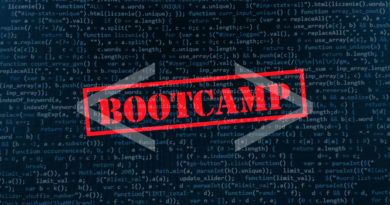The Ultimate Guide to Find The Right Cyber Security Bootcamp
Whether you’re a newbie to the Cybersecurity world or you’re in the intermediate level of things, Cybersecurity Bootcamps can be your one sure stop to gaining new knowledge and exploring new ground as a soldier of the information technology world.
The proliferation of the Cybersecurity Bootcamp has, and still is, hitting the zenith with bootcamps considerably taking more preference over college institutes. The rigor of studying for a long time is being adequately substituted by short-term courses that shines their radar more on conciseness over the bureaucratic system of learning.
But in the abundance of Cybersecurity Bootcamps, how do you get to settle for the one that best represents your goals and knowledge quest? This guide intends to take you by the hand through the dark plot of choosing the right boot camp for the kind of knowledge you seek. Here are some pathways you can thread to make the best selection when you need to.
Write down your goal
Why do you want to join a cybersecurity boot camp? Is it as a beginner, fascinated and in tune with learning something new, or as a prospective professional aiming certain knowledge towards expert certification? Knowing why you want to go to a cybersecurity boot camp can help you make the best choice of which to attend. Although the need for professionals in the field is increasing and will continue to do so in the future, the demand is not totally due to the lack of available hands, but the lack of overly competent hands.
Your goal for settling for a boot camp of choice must center around a specific target. It could be with learning ethical hacking or gaining vastness as a Microsoft Security Engineering, defining your goal before going in search of a Bootcamp can help narrow your search since you’ll only be settling for those that can help you achieve your professional ambition.
Ask about their curriculum
So you are all set to attend a Cybersecurity Bootcamp? Have you taken a look at their array of programs? The curriculum is vital to learning, and since there is no organized body to dictate what is taught at bootcamps and how it is to be taught, most cybersecurity bootcamps will operate on a self-adjusted curriculum that may or may not meet your prospective course standard.
Asking for the curriculum and comparing it with online resources can give you an edge as to what you’ll be learning. You should go to step one to compare and contrast if the curriculum meets your learning goals. The answer you get will decide how you will proceed.
Location is king
It may appear quite easy to sit for any boot camp you can find, but doing so is nothing near to choosing the right one. The location of your boot camp is equally important as is what you’ll learn, and this is in the sense that, cybersecurity bootcamps often have affiliation with local organizations that are ready to offer provisional employment to their best hands.
Bootcamps in urban centers will likely possess more attachments to organizations since they operate on similar wings that afford their graduates easy job placement. Even if you’ll find organizations willing to employ you in a less techie populated area, the pay isn’t usually as juicy. Being strategic with your chosen location can be essential in deciding if you’ll get a job or not, and the kind of job you’ll get when you eventually get one.
Reach Out to Alumni
It’s understood you may want to vet a cybersecurity boot camp from online reviews, while that is a little of something, it is often not enough to guarantee if you won’t be losing your money. Reaching out to Alumni of your prospective cybersecurity boot camp can give you an edge over most other students.
You get to learn everything you need to from how teaching occurs to what is taught and if it is worth applying. Alumni will give you fresh unadulterated reviews since they’ve been through the phase that you’re about to start. They will also make you understand if attending the boot camp will be sufficient in achieving your goals or if you’ll need more professional training after graduation.
Look Up The Teachers
As a prospective cybersecurity specialist, you need to learn from the best hand. One advantage a cybersecurity boot camp should give you over institutionalized learning is the practicability of harnessed knowledge.
Unlike colleges often ran by professors who have theoretical proficiency, cybersecurity bootcamps should be run by industry experts who have a day to day experience in the field.
So before attending a cybersecurity boot camp, you should look up who your tutors are over social media. Try to connect with them on Twitter to see their tweet, how they attend to real-life problems and if they possess true competence in the cybersecurity field.
Pick a workable schedule
Without an iota of deceit, you’ll need grit, determination, and a learning desire to be successful at a cybersecurity boot camp. It isn’t a run-in-run-out thing. Intensity is what will decide the outcome. So when planning to give a cybersecurity boot camp a shot, view and review your schedule properly to ensure it opens enough valves for you to learn.
Most full-time cybersecurity bootcamps operate a 3-6 month course duration with intensive day and night teaching. This will require that you leave your work and other commitments to face learning.
If you are on a job or you have another bidding, most boot camp also offers a 9-12 months part-time course training that allows you to do other things while learning. All in all, you can’t afford to make the mistake of picking a schedule that won’t work for you. Look 10 steps ahead into your future and only settle for the learning schedule that best fits.
While attending a Cybersecurity Bootcamp can change your knowledge grade massively, becoming a competent and sought-after cybersecurity specialist often takes years of experience facing dire real-life scenarios. Carefully selecting a cybersecurity Bootcamp using the guide we have offered will save you money and time and help you achieve your original goals. You can also draw from the insight to predict your chances of getting a job after you’re done with the learning process.




